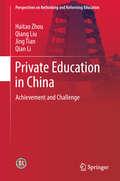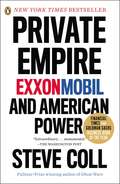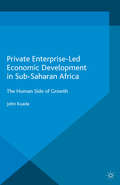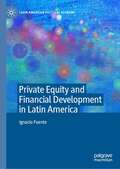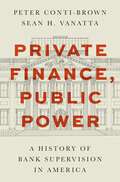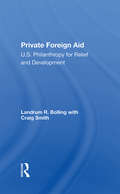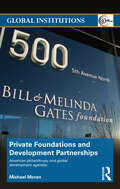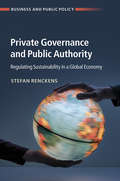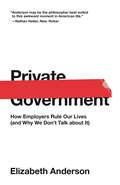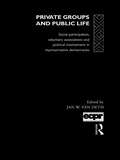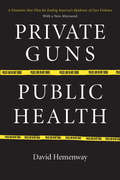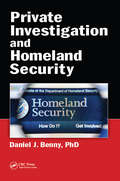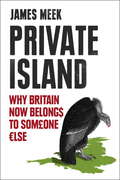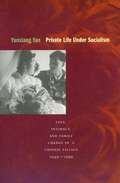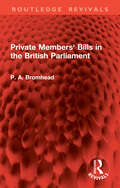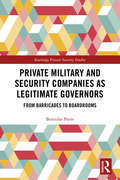- Table View
- List View
Private Education in China: Achievement And Challenge (Perspectives on Rethinking and Reforming Education)
by Qiang Liu Jing Tian Haitao Zhou Qian LiThis book takes an in-depth look at the development of the private education sector in modern China. Readers will find valuable data and materials never before presented in such an accessible and transparent way, together with analyses of the major changes and challenges in the course of this development. The book is organized both chronologically and by topic: it employs a past-present-future order that unites the general arrangement; at the same time, each specific subject is approached historically, not only to show the origins of the problem, but also to link it with the historical-comparative context, in which the evaluation of alternative policy choices become highly viable.Further, the book provides a pioneering account of current problems, adopting a fresh perspective to address the most important aspects of Chinese private education reform. The elaboration on topics concerning private school assets, property rights, legal personality, school operators’ entrepreneurship, benefits and investment returns, school autonomy, and the development of teachers and students, is both empirically rich and highly insightful.The book’s content is chiefly derived from years of fieldwork in private schools and from extensive interviews with hundreds of policy makers, school operators, managers, teachers and students. Since these people are self-conscious about themselves as the actors in and witnesses to the development of Chinese private education over the past three decades, the book places great emphasis on neutrality, allowing the private education landscape to unfold in the context of the privatization of the socialist system after 1978. The book offers an essential guide for anyone who wishes to understand the transformation of Chinese education. It is highly recommendable as a detailed introduction to Chinese education, or as a resource for comparative research on private education from an international perspective.
Private Empire
by Steve CollAn "extraordinary" and "monumental" exposé of Big Oil from two-time Pulitzer Prize winner Steve Coll (The Washington Post)In this, the first hard-hitting examination of ExxonMobil--the largest and most powerful private corporation in the United States--Steve Coll reveals the true extent of its power. Private Empire pulls back the curtain, tracking the corporation's recent history and its central role on the world stage, beginning with the Exxon Valdez accident in 1989 and leading to the Deepwater Horizon oil spill in the Gulf of Mexico in 2010. The action spans the globe--featuring kidnapping cases, civil wars, and high-stakes struggles at the Kremlin--and the narrative is driven by larger-than-life characters, including corporate legend Lee "Iron Ass" Raymond, ExxonMobil's chief executive until 2005. A penetrating, news-breaking study, Private Empire is a defining portrait of Big Oil in American politics and foreign policy.
Private Empire
by Steve CollAn "extraordinary" and "monumental" exposé of Big Oil from two-time Pulitzer Prize winner Steve Coll (The Washington Post) In this, the first hard-hitting examination of ExxonMobil--the largest and most powerful private corporation in the United States--Steve Coll reveals the true extent of its power. Private Empire pulls back the curtain, tracking the corporation's recent history and its central role on the world stage, beginning with the Exxon Valdez accident in 1989 and leading to the Deepwater Horizon oil spill in the Gulf of Mexico in 2010. The action spans the globe--featuring kidnapping cases, civil wars, and high-stakes struggles at the Kremlin--and the narrative is driven by larger-than-life characters, including corporate legend Lee "Iron Ass" Raymond, ExxonMobil's chief executive until 2005. A penetrating, news-breaking study, Private Empire is a defining portrait of Big Oil in American politics and foreign policy.
Private Enterprise-Led Economic Development in Sub-Saharan Africa: The Human Side of Growth
by John KuadaPrivate Enterprise-Led Development in Sub-Saharan Africa provides a novel theoretical and conceptual model to guide research into Africa's economic development. It endorses the view that private enterprise-led growth will help reduce poverty since it strengthens individuals' capacity to care for themselves and their families.
Private Equity and Financial Development in Latin America (Latin American Political Economy)
by Ignacio PuenteShallow capital markets are a key bottleneck for private sector development in Latin America. Still, there is not a large literature on capital markets and corporate governance, or on the politics of regulatory reform and business associations, focused on this region. To help address this gap, this new book introduces private equity into the financial development debate through a Latin American lens. The author looks at the cases of Brazil, Mexico, Chile, Colombia, and Argentina. And proposes a shift in the financial development discussion from institutional explanations focused only on rules to an actor-based argument centered on the role of institutional investors, in particular pension funds .
Private Equity at Work: When Wall Street Manages Main Street
by Eileen Appelbaum Rosemary BattPrivate equity firms have long been at the center of public debates on the impact of the financial sector on Main Street companies. Are these firms financial innovators that save failing businesses or financial predators that bankrupt otherwise healthy companies and destroy jobs? The first comprehensive examination of this topic, Private Equity at Work provides a detailed yet accessible guide to this controversial business model. Economist Eileen Appelbaum and Professor Rosemary Batt carefully evaluate the evidence—including original case studies and interviews, legal documents, bankruptcy proceedings, media coverage, and existing academic scholarship—to demonstrate the effects of private equity on American businesses and workers. They document that while private equity firms have had positive effects on the operations and growth of small and mid-sized companies and in turning around failing companies, the interventions of private equity more often than not lead to significant negative consequences for many businesses and workers. Prior research on private equity has focused almost exclusively on the financial performance of private equity funds and the returns to their investors. Private Equity at Work provides a new roadmap to the largely hidden internal operations of these firms, showing how their business strategies disproportionately benefit the partners in private equity firms at the expense of other stakeholders and taxpayers. In the 1980s, leveraged buyouts by private equity firms saw high returns and were widely considered the solution to corporate wastefulness and mismanagement. And since 2000, nearly 11,500 companies—representing almost 8 million employees—have been purchased by private equity firms. As their role in the economy has increased, they have come under fire from labor unions and community advocates who argue that the proliferation of leveraged buyouts destroys jobs, causes wages to stagnate, saddles otherwise healthy companies with debt, and leads to subsidies from taxpayers. Appelbaum and Batt show that private equity firms’ financial strategies are designed to extract maximum value from the companies they buy and sell, often to the detriment of those companies and their employees and suppliers. Their risky decisions include buying companies and extracting dividends by loading them with high levels of debt and selling assets. These actions often lead to financial distress and a disproportionate focus on cost-cutting, outsourcing, and wage and benefit losses for workers, especially if they are unionized. Because the law views private equity firms as investors rather than employers, private equity owners are not held accountable for their actions in ways that public corporations are. And their actions are not transparent because private equity owned companies are not regulated by the Securities and Exchange Commission. Thus, any debts or costs of bankruptcy incurred fall on businesses owned by private equity and their workers, not the private equity firms that govern them. For employees this often means loss of jobs, health and pension benefits, and retirement income. Appelbaum and Batt conclude with a set of policy recommendations intended to curb the negative effects of private equity while preserving its constructive role in the economy. These include policies to improve transparency and accountability, as well as changes that would reduce the excessive use of financial engineering strategies by firms. A groundbreaking analysis of a hotly contested business model, Private Equity at Work provides an unprecedented analysis of the little-understood inner workings of private equity and of the effects of leveraged buyouts on American companies and workers. This important new work will be a valuable resource for scholars, policymakers, and the informed public alike.
Private Finance, Public Power: A History of Bank Supervision in America
by Peter Conti-Brown Sean H. VanattaThe strange and contested evolution of the management of banking riskBanks in America are private institutions with private shareholders, boards of directors, profit motives, customers, and competitors. And yet the public plays a key role in deciding what risks are taken as well as how, when, and to what end. Public-private negotiations over financial governance has evolved into an essential ecosystem of banking risk management. In Private Finance, Public Power, Peter Conti-Brown and Sean Vanatta offer a new history of finance and public policy in the United States by examining the idiosyncratic way the nation manages financial risk across the public-private divide. Covering two centuries, from the founding of the Republic to the early 1980s, Conti-Brown and Vanatta describe the often-contested, sometimes chaotic, engagement of bankers, politicians, bureaucrats, and others in the overlapping spaces of the public-private system of bank supervision.Conti-Brown and Vanatta trace the different supervisory frameworks that evolved over time, from the imposition of private liability on bank shareholders to the development of the central bank to the creation of federal deposit insurance. Negotiations took place at federal and state levels, but, over time, the federal government assumed most of the responsibility for managing financial risk. Moreover, federal supervisory officials began to undertake more varied tasks, including monitoring racial discrimination and managing financial concentration. Conti-Brown and Vanatta introduce a diverse cast of characters—bankers, politicians, bureaucrats, and others—and show how they navigated two hundred years of financial panics, scandals, and crises to build the system that structures modern America&’s banking system.
Private Foreign Aid: U.s. Philanthropy In Relief And Developlment
by Craig Smith Landrum R BollingOver the past 150 years, Americans have responded repeatedly to the needs of people in foreign lands, providing aid in times of natural disaster, in the wake of war, in the development of resources, in the eradication of disease and poverty and in the battle against hunger. This challenging task has been tackled again and again by churches, corpora
Private Foundations and Development Partnerships: American Philanthropy and Global Development Agendas (Global Institutions)
by Michael MoranThis book explores the influence of private United States (US) philanthropic foundations in the governance of global problems. Through a close scrutiny of four high profile case studies of public-private collaboration, the work addresses the vacuum present in global governance scholarship regarding the influence of foundations, arguing the influence of these actors extends beyond the basic material, and into the more subtle and complex ideational sphere of policy and governance. This book: charts the growth of private forms of governance and foundations’ role in deepening and extending private power in global politics provides a historical examination of private foundations in international affairs including their centrality in the development of the institutional architecture in international health and agriculture and the linkage back to domestic political systems analyses the new modes of philanthropy and giving styles – particularly venture philanthropy and ‘philanthrocapitalism’ – and how these are being rearticulated in the aid architecture and in development discourses evaluates distinctive features and unique attributes of foundations as transnational actors (including their limitations) – how they use these attributes when exercising policy influence and how they negotiate and collaborate with other state and non-state actors in global governance provides an introduction to three prominent foundations – Gates, Rockefeller and the Acumen Fund – and four key partnerships – IAVI, GAVI, AGRA and A to Z textile Mills. This work will be of great interest to students and scholars of international organizations, international political economy and development studies.
Private Governance and Public Authority: Regulating Sustainability in a Global Economy (Business and Public Policy)
by Stefan RenckensAt a time of significant concern about the sustainability of the global economy, businesses are eager to display responsible corporate practices. While rulemaking for these practices was once the prerogative of states, businesses and civil society actors are increasingly engaged in creating private rulemaking instruments, such as eco-labeling and certification schemes, to govern corporate behavior. When does a public authority intervene in such private governance and reassert the primacy of public policy? Renckens develops a new theory of public-private regulatory interactions and argues that when and how a public authority intervenes in private governance depends on the economic benefits to domestic producers that such intervention generates and the degree of fragmentation of private governance schemes. Drawing on European Union policymaking on organic agriculture, biofuels, fisheries, and fair trade, he exposes the political-economic conflicts between private and public rule makers and the strategic nature of regulating sustainability in a global economy.
Private Government: How Employers Rule Our Lives (and Why We Don't Talk about It) (The University Center for Human Values Series #44)
by Elizabeth AndersonWhy our workplaces are authoritarian private governments—and why we can't see itOne in four American workers says their workplace is a "dictatorship." Yet that number probably would be even higher if we recognized most employers for what they are—private governments with sweeping authoritarian power over our lives, on duty and off. We normally think of government as something only the state does, yet many of us are governed far more—and far more obtrusively—by the private government of the workplace. In this provocative and compelling book, Elizabeth Anderson argues that the failure to see this stems from long-standing confusions. These confusions explain why, despite all evidence to the contrary, we still talk as if free markets make workers free—and why so many employers advocate less government even while they act as dictators in their businesses.In many workplaces, employers minutely regulate workers' speech, clothing, and manners, leaving them with little privacy and few other rights. And employers often extend their authority to workers' off-duty lives. Workers can be fired for their political speech, recreational activities, diet, and almost anything else employers care to govern. Yet we continue to talk as if early advocates of market society—from John Locke and Adam Smith to Thomas Paine and Abraham Lincoln—were right when they argued that it would free workers from oppressive authorities. That dream was shattered by the Industrial Revolution, but the myth endures.Private Government offers a better way to talk about the workplace, opening up space for discovering how workers can enjoy real freedom.Based on the prestigious Tanner Lectures delivered at Princeton University's Center for Human Values, Private Government is edited and introduced by Stephen Macedo and includes commentary by cultural critic David Bromwich, economist Tyler Cowen, historian Ann Hughes, and philosopher Niko Kolodny.
Private Groups and Public Life: Social Participation and Political Involvement in Representative Democracies (Routledge/ECPR Studies in European Political Science)
by Jan W. Van DethThis book focuses on the changing relationship between social and political involvement in Western Europe. Empirical case studies examine how new social movements interact with conventional political structures as individuals and groups experiment with new forms of political expression. The results indicate not a declining, but a changing democratic culture.
Private Guns, Public Health
by David HemenwayOn an average day in the United States, guns are used to kill almost eighty people, and to wound nearly three hundred more. If any other consumer product had this sort of disastrous effect, the public outcry would be deafening; yet when it comes to guns such facts are accepted as a natural consequence of supposedly high American rates of violence. Private Guns, Public Health explodes that myth and many more, revealing the advantages of treating gun violence as a consumer safety and public health problem. David Hemenway fair-mindedly and authoritatively demonstrates how a public-health approach-which emphasizes prevention over punishment, and which has been so successful in reducing the rates of injury and death from infectious disease, car accidents, and tobacco consumption-can be applied to gun violence. Hemenway uncovers the complex connections between guns and self-defense, gun violence and schools, gun prevalence and homicide, and more. Finally, he outlines a policy course that would significantly reduce gun-related injury and death.
Private Guns, Public Health, New Ed.
by David HemenwayOn an average day in the United States, guns are used to kill over ninety people and wound about three hundred more; yet such facts are accepted as a natural consequence of supposedly high American rates of violence. Private Guns, Public Health reveals the advantages of treating gun violence as a consumer safety and public health problem—an approach that emphasizes prevention over punishment and that has successfully reduced the rates of injury and death from infectious disease, car accidents, and tobacco consumption. Hemenway fair-mindedly and authoritatively outlines a policy course that would significantly reduce gun-related injury and death, pointing us toward a solution.
Private Health Insurance and the European Union: Eu Legislation At The National Level
by Philippe Martin Cyril Benoît Marion Del SolResearch has paid little attention to date on how European Union law and regulation affect both the public-private mix in healthcare and the organization of private health insurance as an industry. Filling this gap, this collective book provides insights on the political economy of EU insurance regulation, its impact on private health insurers and on its interactions with domestic healthcare policy-making in four countries. Assembling original contributions drafted by a multidisciplinary team, Private Health Insurance and the European Union offers a thorough examination of a largely unrecognized source of EU influence in healthcare – and sheds a new light on the role played by private actors in social policy. Chapter 1 is available open access under a Creative Commons Attribution 4.0 International License via link.springer.com.
Private Higher Education in Asia: Changing the Dynamics of Privateness and Publicness (Global Realities in Private Higher Education)
by Daniel C. Levy Akiyoshi Yonezawa Quang ChauAs Asia alone holds the majority of the world’s fast-expanding private higher education (PHE), this volume probes the character, diversity, and significance of Asian PHE.Across seven national case studies, astride both developing and developed countries, older and newer HE systems, in entrenched democracies to creakier ones, to Communist rule, the volume systematically addresses a common PHE typology. This fosters volume coherence and cross-national comparison.The two most central comparisons within each country are private vs public and private versus private. Authors all identify significant differences between PHE and its longer standing public counterparts, though with variation in the degree and contours of blurring across sectors. Even more novel for scholarship on this subject matter, authors dig into patterns of differences and similarities across the now quite varied manifestations of PHE: religious, gender, nationally elite, increasingly business and job-oriented, international, nonprofit, for-profit etc. However rigorous the comparative frameworks contributing to volume coherence, authors integrate particulars of national historical and contemporary context wherever their national expertise leads them. This helps make the book appropriate for those generally interested in Asian affairs, especially in East and Southeast Asia. At the same, the private-public and private-private comparisons engage most key issues of top concern to those keenly interested in higher education generally: institutional autonomy versus government control, regulation, competition across institutions, management, effectiveness and innovation, faculty composition and roles, student composition and roles, accountability measures, challenges of quality assurance amid rapid expansion, the partial privatization of public institutions, tuition, internationalization, and so forth.The volume will be valuable for all concerned with global PHE and HE overall. It should likewise be an important work for those studying, working in, or making policy within or for PHE in Asia.
Private Investigation and Homeland Security
by Daniel J. BennyThe threat against the homeland continues and the private investigator plays a critical part in this effort. This includes in providing criminal, civil and background investigation, protective service, security consulting and electronic sweeps. The text will provide an overview of the role of private investigation in protection of the homeland and show how such skill can be utilized by business and government in this effort.
Private Island
by James Meek"The essential public good that Margaret Thatcher, Tony Blair and now Cameron sell is not power stations, or trains, or hospitals. It's the public itself. it's us." In a little over a generation the bones and sinews of the British economy - rail, energy, water, postal services, municipal housing - have been sold to remote, unaccountable private owners, often from overseas. In a series of brilliant portraits the award-winning novelist and journalist James Meek shows how Britain's common wealth became private, and the impact it has had on us all: from the growing shortage of housing to spiralling energy bills. Meek explores the human stories behind the incremental privatization of the nation over the last three decades. He shows how, as our national assets are sold, ordinary citizens are handed over to private tax-gatherers, and the greatest burden of taxes shifts to the poorest. In the end, it is not only public enterprises that have become private property, but we ourselves. Urgent, powerfully written and deeply moving, this is a passionate anatomy of the state of the nation: of what we have lost and what losing it cost us - the rent we must pay to exist on this private island.
Private Life Under Socialism: Love, Intimacy, and Family Change in a Chinese Village, 1949-1999
by Yunxiang YanFor seven years in the 1970s, the author lived in a village in northeast China as an ordinary farmer. In 1989, he returned to the village as an anthropologist to begin the unparalleled span of eleven years’ fieldwork that has resulted in this book―a comprehensive, vivid, and nuanced account of family change and the transformation of private life in rural China from 1949 to 1999. <p><p> The author’s focus on the personal and the emotional sets this book apart from most studies of the Chinese family. Yan explores private lives to examine areas of family life that have been largely overlooked, such as emotion, desire, intimacy, privacy, conjugality, and individuality. <p><p> He concludes that the past five decades have witnessed a dual transformation of private life: the rise of the private family, within which the private lives of individual women and men are thriving.
Private Lord Crawford's Great War Diaries: From Medical Orderly to Cabinet Minister
by Christopher ArnanderFrom Britain’s only Cabinet-level politician to serve in the ranks during World War I, diary entries and letters detailing life on the Western Front.This unusual account is written by the 27th Earl of Crawford and Balcarres, an active Lancashire MP for eighteen years until he inherited the title on his father’s death in 1913. In 1915 his sense of patriotic duty drove him to join the RAMC as a Private, although he was married with seven children, head of a large company and well over age. Despite his privileged status in civilian life, he cheerfully served as a humble medical orderly on the Western Front for some fourteen months and was given responsibility for two operating theatres.A gifted author and diarist, his daily entries provide a fascinating insight into life near the front over this period and, together with his letters home, his writings reflect the stark contrast between his home life and the one he experienced in Flanders. Of particular interest are his astute observations on his contemporaries of all ranks, the conduct of the war, medical services and life in wartime France. Remarkably he never complains at his lot (although often sharply critical of GHQ and politicians) or regrets his decision.As the author was the only Cabinet-level politician to serve “in the ranks” during the conflict, this is a record without any parallel. In 1916 Crawford was persuaded eventually to return to London and join Asquith’s Cabinet before staying on under Lloyd George until 1922. After the war, he became a director, trustee or advisor of several museums, such as the British Museum, National Gallery and others. The Crawford Papers (his diaries, edited by Prof. John Vincent) describe his civilian experiences from 1892 to 1940 and are seen as an invaluable source for students of politics, art, industry and society in Britain.The book contains three maps and seventy-five illustrations.This fascinating book fills a needy gap at a time of unprecedented interest in The Great War.Praise for Private Lord Crawford’s Great War DiariesOne of The Times “Books of the Year” 2013“[Crawford’s] previously unpublished war diaries, meticulously edited by his grandson, offer a fascinating glimpse into life at the front and in the upper reaches of politics at home—and contain some frank comments on his former Cabinet colleagues.” —Literary Review“Lord Crawford was the only Cabinet-level politician to serve “in the ranks” during World War I as a private. A gifted author and diarist, his daily entries provide a fascinating insight into life in the frontline over a fourteen-month period.” —History Scotland
Private Members' Bills in the British Parliament (Routledge Revivals)
by P. A. BromheadOriginally published in 1956, P. A. Bromhead, with this book, filled a gap in the literature on the British Parliament by examining the role which Private Members’ Bills had to play in the modern political system at the time. He describes in detail the procedure through which Private Members’ Bills had to pass, and indicates the pitfalls which had to be negotiated. He examines the proceedings on such bills during the previous fifty years, with particular attention to the period since 1945, and observes the changes which had taken place in the habits of Parliament with regard to the types of bills introduced and the character of the debates on the bills. The author pays particular attention to the role of the Government and of the parties in this field, and suggests that a significant evolution was taking place, so that Parliament was coming to assign a special place of positive value to these measures in a fairly distinct field of legislative activity. Today it can be read in its historical context.
Private Metropolis: The Eclipse of Local Democratic Governance (Globalization and Community #32)
by Dennis R. Judd Alba Alexander Evan McKenzieExamines the complex ecology of quasi-public and privatized institutions that mobilize and administer many of the political, administrative, and fiscal resources of today&’s metropolitan regionsIn recent decades metropolitan regions in the United States have witnessed the rise of multitudes of &“shadow governments&” that often supersede or replace functions traditionally associated with municipalities and other local governments inherited from the urban past. Shadow governments take many forms, ranging from billion-dollar special authorities that span entire urban regions, to public–private partnerships and special districts created to accomplish particular tasks, to privatized gated communities, to neighborhood organizations empowered to receive private and public funds. They finance and administer public services ranging from the prosaic (garbage collection and water utilities) to the transformative (economic development and infrastructure). Private Metropolis demonstrates that this complex ecosystem of local governance has compromised and even eclipsed democratic processes by moving important policy decisions out of public sight. The quasi-public institutions of urban governance generally escape the budgetary and statutory restraints imposed on traditional local governments and protect policy decisions from the limitations and vagaries of electoral politics. Moving major policy decisions into a privatized and corporatized realm facilitates efficiency and speed, but at the cost of democratic oversight. Increasingly, the urban electorate is left debating symbolic issues only tangentially connected to the actual distribution of the resources that affect people&’s lives. The essays in Private Metropolis grapple with the difficult and timely questions that arise from this new ecology of governance: What are the consequences of the proliferation of special authorities, privatized governments, and public–private arrangements? Is the trade-off between democratic accountability and efficiency worth it? Has the public sector, with its messiness and inefficiencies—but also its checks and balances—ceded too much power to these new institutions? By examining such questions, this book provokes a long-overdue debate about the future of urban governance.Contributors: Douglas Cantor, California State U, Long Beach; Ellen Dannin, Pennsylvania State U; Jameson W. Doig, Princeton U; Mary Donoghue; Peter Eisinger, New School; Steven P. Erie, U of California, San Diego; Rebecca Hendrick, U of Illinois at Chicago; Sara Hinkley, U of California, Berkeley; Amanda Kass, U of Illinois at Chicago; Scott A. MacKenzie, U of California, Davis; David C. Perry, U of Illinois at Chicago; James M. Smith, U of Indiana South Bend; Shu Wang, Michigan State U; Rachel Weber, U of Illinois at Chicago.
Private Military Companies: New Actors of International Relations
by Lt. Colonel Emile MarieWe can only be struck by the range of services developed in a few years by private military companies (intelligence, training, operations support, logistical support, doctrine advice ...), to cover the entire spectrum activities formerly devolved to armies, including in the field of combat. In 2010, in the Afghan theater, nearly 60% of US-hired staff were employed by a private military company. With approximately one million employees worldwide and a turnover estimated at between $ 200 and $ 400 billion, it becomes particularly legitimate to ask the question of the place occupied by these private military companies on the international scene, and especially of evoking the extent of their influence, particularly in terms of foreign policy. Most state citizens do not really know how to situate private military companies in the corporate landscape. Their assimilation to mercenarism is still significant. The popular works about them only narrate the experiences of some of their employees. The more specialized works focus mainly on the lack of legislation or the history that surrounds these societies. Thus, almost no literature has been interested in the fact that private military companies play a fundamental role on the international scene, often at the service of the States that employ them. This game is actually played discreetly, but we can only note that private military companies have become essential elements in international relations, as well as large NGOs or large companies. If the latter are considered as “new actors” in international relations, can not we say the same of private military companies?
Private Military and Security Companies and States
by Christopher SpearinThis book identifies and explains the functional and ideational boundaries regarding what states and Private Military and Security Companies (PMSCs) both do and possess regarding land power, sea power, and air power. Whereas the mercenaries, privateers, and chartered companies of years past held similar characteristics to state military forces, the PMSCs of today are dissimilar for two reasons: a conventional forces norm amongst states and a state proclivity towards the offensive. These factors reveal both the limitations of and the possibilities for contemporary security privatization. This volume is ideal for civilian and military practitioners and students wishing to develop a detailed understanding of what the private military and security industry has to offer and why it is structured the way it is.
Private Military and Security Companies as Legitimate Governors: From Barricades to Boardrooms (Routledge Private Security Studies)
by Berenike PremThis book examines the legitimation of Private Military and Security Companies (PMSCs), focusing on the controversy between PMSCs and nongovernmental organizations (NGOs). While existing studies disproportionately emphasizes the ability for companies and their clients to dominate and shape perceptions of the industry, this book offers an alternative explanation for the oft-cited normalization of PMSCs and the trend to privatize security by analyzing the changing relationship between PMSCs and NGOs. It uses the concept of ‘norm entrepreneurship’ to elucidate the legitimation game between these two dissimilar actors. Starting from the 1990s, the book shows that the relationship between PMSCs and NGOs has undergone a transition by literally moving from ‘the barricades to the boardrooms’. After years of fierce advocacy and PR campaigns against PMSCs, today both actors increasingly collaborate in multi-stakeholder initiatives, elevating the status of PMSCs from a scorned actor to a trusted partner in the regulation of the industry. The work offers a comprehensive explanation of when and why this kind of collective norm entrepreneurship is likely to occur. This book will be of interest to students of PMSCs, critical security studies, global governance, international norms, and International Relations.
